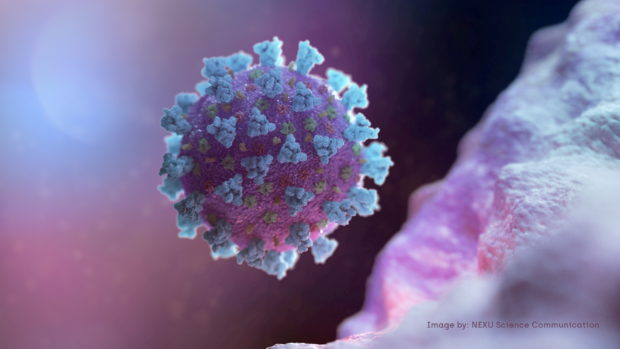Expert: Early to say COVID-19 variant B.1.1.318 should cause an alarm

FILE PHOTO: A computer image created by Nexu Science Communication together with Trinity College in Dublin, shows a model structurally representative of a betacoronavirus which is the type of virus linked to COVID-19, shared with Reuters on February 18, 2020. NEXU Science Communication/via REUTERS
MANILA, Philippines — It is too early to say that the B.1.1.318 variant of COVID-19 first detected in Mauritius should be a cause for alarm for Filipinos since experts are still studying its characteristics, an infectious disease expert said Tuesday.
According to Dr. Rontgene Solante, a member of the country’s Vaccine Expert Panel, health experts need more data to determine the transmissibility of the B.1.1.318 variant and its effect on patients.
“This is not yet considered a variant of concern or even a variant of interest. They are still monitoring kung ano ang characteristics ng variant na ito [the characteristics of this variant]. We need more data and we need to monitor it regarding its ability to be highly transmissible and to cause more severe infection. It is too early to say this is something that should be alarming to us,” he told ABS-CBN’s Teleradyo.
Solante said there are also no established findings yet about the said variant unlike COVID-19 variants of concern like the Alpha variant first detected in the United Kingdom and Delta variant first reported in India.
“We’ll just have to wait for more data on this kasi hindi naman din gaano karami ang nakitaan nito. We need to wait for reports coming from those countries na medyo mayroon nang nakikita na ganitong patients,” he added.
Article continues after this advertisement(We’ll just have to wait for more data on this because there are not many cases yet. We need to wait for reports from other countries that have more cases of this variant.)
Article continues after this advertisementAccording to Solante, the manifestations of symptoms for patients who have the B.1.1.318 variant could be the same as with other COVID-19 patients.
“Most of the variants of concern kung i-compare mo sa different variants, the Delta variant has one of the slightly unique presentation, pero itong mga ganitong mga klaseng variants na hindi pa natin alam kung ano ang talagang characteristic nito or behavior, ‘yung manifestations nito ay pareho lang sa any patient with COVID-19 because they have the same makeup in terms of ability to cause infection and cause severe disease especially for the vulnerable population,” said Solante.
(If we will compare the variants of concern, the Delta variant has one of the slightly unique presentation, but for these variants that we don’t know the characteristics yet, their manifestations are the same as with any COVID-19 patient because they have the same makeup in terms of ability to cause infection and severe disease especially for the vulnerable population.)
“So more or less wala tayong makikita na any symptoms na unique na masasabi natin na this is due to this particular variant or mutation,” he added.
(So more or less, we won’t see any symptoms unique to this particular variant or mutation.)
The Department of Health reported on Monday the Philippines’ first case of the said variant from a 34-year old man who arrived in the country on March 5. He already recovered from the disease on March 21.
For more news about the novel coronavirus click here.
What you need to know about Coronavirus.
For more information on COVID-19, call the DOH Hotline: (02) 86517800 local 1149/1150.
The Inquirer Foundation supports our healthcare frontliners and is still accepting cash donations to be deposited at Banco de Oro (BDO) current account #007960018860 or donate through PayMaya using this link.